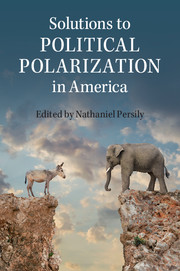Book contents
- Frontmatter
- Dedication
- Contents
- Contributors
- Introductory Chapters
- 1 Introduction
- 2 Causes and Consequences of Polarization
- 3 Confronting Asymmetric Polarization
- Reforming the Electoral System
- Strengthening Parties
- Empowering and Informing Moderate Voters
- Lowering Barriers to Policy Making
- Index
- References
3 - Confronting Asymmetric Polarization
from Introductory Chapters
Published online by Cambridge University Press: 05 May 2015
- Frontmatter
- Dedication
- Contents
- Contributors
- Introductory Chapters
- 1 Introduction
- 2 Causes and Consequences of Polarization
- 3 Confronting Asymmetric Polarization
- Reforming the Electoral System
- Strengthening Parties
- Empowering and Informing Moderate Voters
- Lowering Barriers to Policy Making
- Index
- References
Summary
The goal of this volume is to explore possible solutions to a host of problems associated with polarization. Effective prescription, however, hinges on accurate diagnosis. Far too many discussions of polarization are based on a flawed one: that polarization is broadly similar in degree and kind at both ends of the political spectrum. This claim that political polarization is symmetrical is false: polarization is mainly driven by a sharp retreat from moderation on the right side of the spectrum. This development has occurred across multiple dimensions, from voting patterns and intensity of preferences to concrete policy demands and willingness to use once-rare hardball tactics. Prescriptions that ignore or downplay this reality are very likely to be ineffective and may even make the real problems worse.
This chapter briefly summarizes the evidence that contemporary polarization is asymmetric, before turning to a slightly longer discussion of the mechanisms that generate and sustain this outcome. This discussion in turn provides the basis for identifying initiatives that might address the central and most corrosive aspect of our “polarized politics”: the ever greater extremism of the modern Republican Party.
POLARIZATION IS ASYMMETRIC
Although it is still not conventional to frame discussions of polarization as asymmetric, there is mounting evidence that the increasing distance between the two parties is primarily a consequence of the Republican Party's 35-year march to the right (Hacker and Pierson 2005; Mann and Ornstein 2012; Theriault 2013). As the creators of DW-Nominate scores, the core data that have been used to document rising elite polarization, recently put it, “We should be careful not to equate the two parties' roles in contemporary political polarization: the data are clear that this is a Republican-led phenomenon where very conservative Republicans have replaced moderate Republicans and Southern Democrats … Moreover, the rise of the ‘Tea Party’ will likely only move Congressional Republicans further away from the political center” (Hare, McCarty, Poole, and Rosenthal 2012).
Extensions of DW-Nominate to presidents and to vice-presidential candidates show the same pattern.
- Type
- Chapter
- Information
- Solutions to Political Polarization in America , pp. 59 - 70Publisher: Cambridge University PressPrint publication year: 2015
References
- 26
- Cited by



